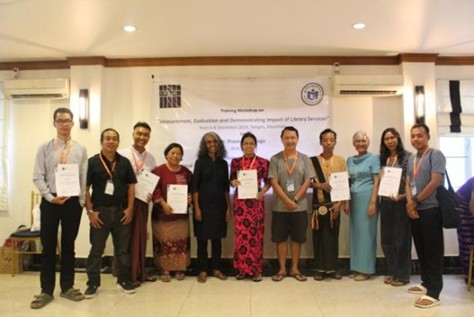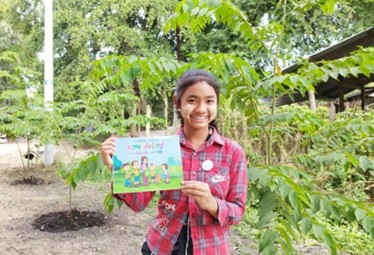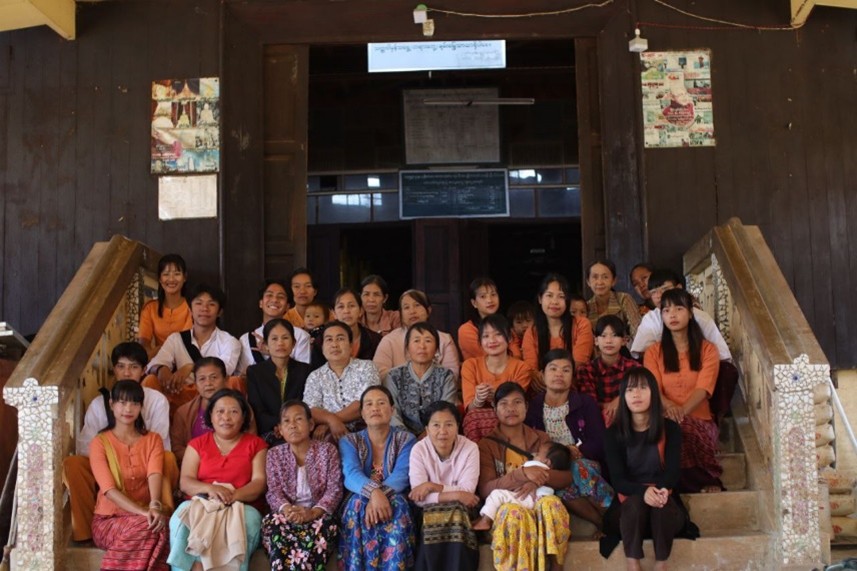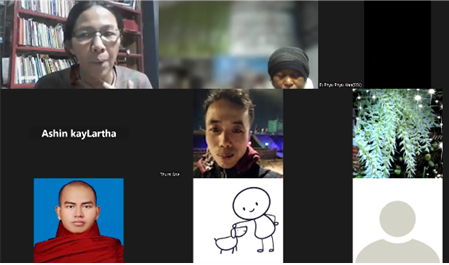Empowering Communities Through Libraries: A Success Story from Myanmar
07 March 2025
Community libraries play a crucial role in supporting education, culture, and social development. In many ways, community librarians contribute to the United Nations Sustainable Development Goals (SDGs) without even realizing it. However, we often face challenges in resources and engagements.
Everything changed after attending the three-day workshop on “Measurement, Evaluation, and Demonstration Impact of Library Services” organized by the International Federation of Library Associations and Institutions (IFLA) and the Myanmar Library Association (MLA). Through the workshop, our community librarians have gained a deeper understanding of how to make their libraries more effective and impactful. For the first time in our careers, we were armed with new skills and strategies to transform the space for community more systematically and serve as hubs for local people, provide access to resources, services, and programs adapted to the needs of the community.

After returning to our regions, we learned how to demonstrate impact and communicate value, bringing newfound hope and strategies for community development. Community libraries across Myanmar are now leading projects that empower their communities. Below are examples of what has been done by participants who attended the course.
- One such example comes from Ko Soe Wai Han, who noticed that children in his community were deeply concerned about the environment, particularly climate change. This interest was sparked by a book in his library that discussed environmental topics. One of the girls took the lead, and the group of children met every Sunday to plant trees in their community. It has been six months, and the project is still going strong. In his reading clubs, he encourages young people to think critically and how they can make a difference, showing how libraries can play a pivotal role in environmental activism.
“I worked with children who are interested in planting trees by increasing awareness of the importance of library impact in addressing environmental challenges. This initiative started from a book from my library. Concerned about climate change, a group of children has been planting trees every Sunday for the past six months” Ko Soe Wai Han, Walking Book Mobile Library, Ye-U, Sagaing

- Another notable success story comes from Summer Shelter Library, which applied the training resources to write a short-term project proposal. As a result, they formed a partnership with Coca Cola company in 2025. In January 2025, Summer Shelter Library supported 50 households across two villages, with 25 households in each village. Through this project, they introduced mental health awareness by screening documentaries and provided Paper Quilling Art training to help local people gain new skills for income generation. This project went beyond physical recovery, highlighting mental health and economic empowerment as essential aspects of disaster recovery, showing how libraries can play a central role in community rebuilding.
“We made a partnership project with Coca-Cola Company and supported 50 households in two villages of the flood-affected areas in Inlay Lake. Beyond addressing physical health, we encouraged mental health awareness by screening documentaries. We also provided Paper Quilling Art Training as skill-based training for creating future income opportunities. We are now assessing the impact of our project in sustaining and ensuring resilience in affected communities. The project has strengthened networking among librarians for future collaboration practices.” (Thida Htway, Summer Shelter Library)

- At the Maubin Community Development Center, Poe Ei Zar has taken the tools from the workshop and shared them with others through her Zoom training sessions. She focused on teaching participants about the Logic Model, helping them understand how to plan, implement, and measure the impact of their projects. Her efforts highlight how community librarians can use the tools learned in training to build capacity and create a positive change in their communities.
“I continued to share the content of the workshop (especially Logic Models) in my trainings via Zoom. We have made many Projects and so I mainly share about the Logic Model: the outcome, output, and till the impact to the participants of our training.” Poe Ei Zar, Maubin Community Development Center, Maubin
- Ko De De has turned his library into a cultural hub, attracting youth through literacy, art, and music. He introduced guitar lessons and other musical activities in his library. The library has become a space where young people not only come to read but also to participate in creative pursuits. This initiative has also built a foundation for a future generation of library volunteers. Ko De De has shown how libraries can engage youth and build community through non-traditional library services.
“I tried and encouraged youth to come to the library by offering digital literacy and art training. Youths come to the library for reading and playing guitar or other musical instruments. These young people are the future volunteers who will continue supporting the library.”
Ko De De, Intensity Library, Mandalay
- Zu Zu Hlaing demonstrated a strong commitment to community development through libraries. After attending the workshop, Zu Zu Hlaing expressed her intention to apply training materials to plan for the future of her library. Though she faced some language barriers during the training, she worked hard to understand the core concepts and is now planning a one-year strategy for her library. She aims to hold a meeting to develop a comprehensive plan that will focus on community needs and outcomes.

“I will definitely use the training materials like Logic Model, impact storytelling and data visualization I developed a one-year plan for improving library impact after attending this training.” – Zu Zu Hlaing, Myat Sayar Library
While many community libraries have successfully applied the training materials, some face significant challenges. Ko Thura Soe from Lin Yaug Chi Library shared that due to the current situation, he has been unable to put the training into practice. However, he remains determined to apply these strategies when circumstances allow. His perseverance reflects the resilience of community librarians who continue to hold onto hope, even in difficult times.
These stories highlight the role of the community libraries in Myanmar in supporting education, economic development and community resilience. Despite challenges such as language barriers, political instability, and limited resources, these librarians demonstrate commitment and creativity in making a lasting impact on their communities. Their efforts ensure sustainable change and a path towards a better future for all.
The knowledge gained from the workshop enables libraries to remain vital institutions by continuously adapting to users’ changing needs, supporting program outcomes, and aligning with broader development goals.
Contributed by Thida Htway, Librarian, Summer Shelter Library, Taunggyi, Shan State